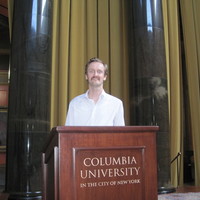Books by Joseph Wiinikka-Lydon

War and genocide challenge deeply held notions of what it is to be human. The pressures of such p... more War and genocide challenge deeply held notions of what it is to be human. The pressures of such political violence pose stark choices for individuals, who may have to lie, cheat, neglect the vulnerable, and even kill, in order to survive or to save their loved ones. These experiences can leave one with the feeling that they have lost the ability or even the right to try and be “good,” however that is understood. Such “moral injuries” can strike at the core of one’s identity and sense of oneself as someone who can strive to be moral. This can then undermine one’s trust in the world and any sense of hope about the future. Survivors themselves stress these moral consequences when speaking about the stakes involved in war, yet scientific studies of political violence often overlook this dimension of political violence. Research into the political, cultural, and economic causes and effects of war often lack rich moral vocabularies, and so, often do not have the means to articulate the way violence affects moral being. This is a critical topic, as the ability to imagine oneself and the world as capable of goodness affects not only individuals but also their societies and collective efforts to imagine more peaceful futures. How, then, do we speak of shattered worlds in ways that help us both do justice to and learn something critical about violence, subjectivity, and morality without reducing such experience to economic, political, or social categories?
"Moral Injury and the Promise of Virtue" illustrates how ethics can help answer this question. It argues that the languages and concepts ethicists have developed to better understand morality and moral experience are a potential resource for speaking about moral injury in a way that can bring out the moral stakes involved for survivors. Specifically, the work turns to virtue language, which has vocabularies to describe moral experience and change, and in particular, Iris Murdoch’s understanding of virtue with its rich vocabulary and notions of the human. Chapter by chapter, the book develops Murdoch’s thought so it can be applied to real life cases, articulating and accounting for moral injury. The potential of this application is demonstrated throughout by engaging Murdoch’s thought with ethnographic and biographical accounts from the siege of Sarajevo during the genocidal Bosnian war of the 1990s. The Bosnian war generated many memoirs and ethnographies that testify to the experience of moral injury, making it a highly relevant case study for this book. The work also engages sociologists, psychologists, and anthropologists researching issues of violence and subjectivity to demonstrate how ethicists who use virtue, such as Murdoch, can make direct contributions to the social sciences and interdisciplinary subjects such as violence.
Articles by Joseph Wiinikka-Lydon

Journal of Ethics, 2023
Michael Walzer’s foundational essay on dirty hands raises the very possibility of a good person i... more Michael Walzer’s foundational essay on dirty hands raises the very possibility of a good person in politics. Dilemmas in the context of high stakes situations sometimes require politicians to compromise their morality and character for the sake of the greater good by choosing the lesser evil. Much has been written about dirty hands, but little has been said about Walzer’s implicit virtue ethics. This essay sketches this implicit virtue ethics, which is central to Walzer’s argument. These are “dirty” virtues, however, that allow one to choose the lesser evil in a dilemma while recognizing that, although evil was mitigated, and some degree of good achieved, wrong done is still wrong done. For this to work, Walzer argues the politician must be and feel guilty, making this an odd virtue ethics that requires a degree of suffering from the politician. The essay further develops this notion of dirty virtue through com‑ parison with Lisa Tessman’s “burdened virtue,” arguing at the end that the guilt and instrumental suffering, which are so central to Walzer’s virtue ethic, may be more corrosive to practical reasoning and character than Walzer allows for.
For a free version (read only) visit: https://rdcu.be/dledy
Journal of Religious Ethics, 2021
Moral injury is a term coined both to reflect the moral dimension of wartime experience and to cr... more Moral injury is a term coined both to reflect the moral dimension of wartime experience and to critique overly clinical approaches to psychological harms originating in wartime. Originally defined not only with the tools of the behavioral sciences but also literature and philosophy, clinical approaches have come to dominate moral injury discourse over the past decade. This article argues for a return to interdisciplinarity by engaging metaphysics and ethics, and in particular Iris Murdoch’s post-Christian notions of the Good and void, to help better account for the experiences of veterans who claim that they hurt not only physically but also morally as a result of their wartime experience.

Philosophy Today , 2020
Using the case of the Bosnian War during the 1990s, and drawing on Iris Murdoch’s philosophy, thi... more Using the case of the Bosnian War during the 1990s, and drawing on Iris Murdoch’s philosophy, this paper develops an understanding of moral vulnerability, where one’s ability to imagine certain ways of being ethical can be transformed through the extreme violence of war and genocide. There is a vulnerability to moral injury through violence that is grounded in the way persons imagine themselves and the world. Beginning with the wartime diaries of Zlatko Dizdarević, a survivor of the Bosnian wars of the 1990s, the paper turns to different understandings of moral injury, as well as Margaret Urban Walker’s understanding of “moral vulnerability.” I argue these approaches do not capture an important dimension in Dizdarević’s witness. The paper then turns to Iris Murdoch’s philosophy to begin to articulate and account for this dimension and sketch an understanding of moral vulnerability distinct from current moral injury discourses.
Special issue, Dimensions of Vulnerability, edited by Martin Huth and Gerhard Thonhauser.

Journal of Medicine and Philosophy, 2019
Moral injury is a term whose popularity has grown in psychology, psychiatry, as well as philosoph... more Moral injury is a term whose popularity has grown in psychology, psychiatry, as well as philosophy over the last several years. This presents challenges, as these fields use the term in different ways and draw their understanding from different sources, creating the potential for contradiction. This, however, is also an opportunity. Comparison between behavioral sciences and philosophy can help enrich understandings of harms considered not just psychological but moral. To this end I provide an overview of the more influential writing of moral injury mapping them into three, broad discourses: clinical, juridical-critical, and structural. This overview then leads to a discussion of how comparative engagement between these discourses promises to expand on current theories of moral harm. I argue that such a comparison will demonstrate that more emphasis on structural violence will strengthen current understandings of moral injury, often understood in a more narrow sense to be a result of more direct, physical violence, allowing us to view moral injury as a result of institutional and social violence and injustices.
Philosophy, 2018
Moral injury describes the effects of violence on veterans beyond what trauma dis- course can des... more Moral injury describes the effects of violence on veterans beyond what trauma dis- course can describe. I put moral injury in conversation with a separate but related concept, dirty hands. Focusing on Michael Walzer’s framing of dirty hands and Jonathan Shay’s understanding of moral injury, I argue that moral injury can be seen as part of the dirt of a political leader’s dirty hands decisions. Such comparison can focus more attention on the broader institutional context in which such dirty hands decisions are executed, while contributing to the growing vocabulary of moral conflict, trauma, and harm.
Political Theology, 2016
Moral injury is a term developed specifically to highlight the moral harm accrued by U.S. veteran... more Moral injury is a term developed specifically to highlight the moral harm accrued by U.S. veterans during war, the salience of which seems to exceed the analytical range of terms such as “trauma.” Veterans can feel that they vio- lated fundamental moral ideals, leaving some to feel they have lost the ability to be “good.” Moral injury as a term originally had an important political dimension, however, one that has been lost in a turn to a more clinical approach. I argue that the experience of moral injury can lend itself to poten- tial, prophetic insights into the effects of one’s culture on the wider world. Instead of seeing moral injury as a disorder in need of clinical treatment, it can be the basis of a religiously informed social ethic empowering veterans to engage the broader social conditions and policies that lead to war in the first place.

Journal of Interreligious Dialogue, 2013
My essay will provide an example, using the now classic case of the Bosnian War, of how religious... more My essay will provide an example, using the now classic case of the Bosnian War, of how religious practice, particularly Christian practice, can adversely affect a political crisis, as well as open up opportunities for how religion can work to ease political conflict. Specifically, I examine four ways that ethnic cleansing was a religious practice during the Bosnian War (1992-1995). Through this examination, I show there was a moral logic and divine command ethic at work, where understandings of conversion—that is, the Christian practice of evangelism—were related conceptually and practically to ethnic cleansing, so that cleansing was at times a corollary practice of evangelism in that specific context. This can help us better understand the central, motivating role that religious imaginaries and practices had in the war. Even though scholars have conducted important and extensive analyses of the role of religion and genocide in Bosnia, we have yet to explicitly frame the conflict in this way.
Journal of Religion and Society, 2010
Focusing on the use of Marian imagery from Medjugorje during the Bosnian War (1992- 1995), and em... more Focusing on the use of Marian imagery from Medjugorje during the Bosnian War (1992- 1995), and employing R. Scott Appleby’s use of the concept, sacred ambivalence, this essay will examine how a religious image proclaiming peace can also support violence and war. It will show that a Croat nationalist ideology at work during the war interpreted Mary’s peace through a hermeneutic of violence, where violence was necessary to restore peace – defined under this ideology as a landscape of political, religious, and cultural homogeneity.
Religious Studies News, 2012
A few months after I graduated from college, my father died. He passed away in our south New Jers... more A few months after I graduated from college, my father died. He passed away in our south New Jersey home on the front porch, which was narrow and made of concrete. It led to a short walk of white gravel outlining a front yard that, year after year, my mother would curse at for taking in her grass seed and spitting back nothing but moss. Our Pine Barrens soil was poor and atavistic, a remnant from the time when the southern part of the state lay under the Atlantic, back when dinosaurs still walked the earth. Five years after my mother died, my father -tired from battling that ungrateful yard -sat down for a break on the porch and never woke up. He died as he had lived, tired but not entirely unhappy, asleep on a chair after a day of hard work.
Books Chapters by Joseph Wiinikka-Lydon
All rights reserved. No part of this book may be reproduced in any form or by any electronic or m... more All rights reserved. No part of this book may be reproduced in any form or by any electronic or mechanical means, including information storage and retrieval systems, without written permission from the publisher, except by a reviewer who may quote passages in a review.
Guest Editor by Joseph Wiinikka-Lydon
Book Reviews by Joseph Wiinikka-Lydon
Journal of Peace and Justice Studies
Panels Organized by Joseph Wiinikka-Lydon

Restorative Justice interest group. Society of Christian Ethics Conference. Louisville, KY. , 2019
The session features both scholars and activists/organizers working on issues of race, gender, ge... more The session features both scholars and activists/organizers working on issues of race, gender, gender identity, and sexual orientation. The session is organized so that each presenter will contribute a different aspect of how the idea of moral injury might help us better understand the impact of racism and internalized racism on social justice movements. There will be special emphasis on how the violence of racism and structural injustice can create moral injuries that inhibit solidarity between marginalized groups. The presentations will be structured so at least half of the time of the session will be open to conversation with the audience, and the presentation will be more open ended so as to invite participation for those who attend. We have include two presenters connected to Louisville, one who lives and works there, and another who works within the USPCA, which is headquartered in Louisville. All participants have lived and worked in southern states with the majority having lived in or have work connected to Kentucky. There is also a balance between transgender and cisgender participants, as well as a majority of LGBTQ persons, so that the discussion can also look at the intersection of gender and sexual orientation all with race.
Panelists:
• Reece Chenault, National Coordinator, U.S. Labor Against the War, Louisville, KY
• Jessica Vazquez Torres, National Program Director and Core Trainer, Crossroads Antiracism Organizing and Training, Decatur, GA
• Joseph Wiinikka-Lydon, Researcher and Fellow, Center for Ethics, University of Pardubice, Pardubice, Czech Republic
This panel of four papers aims to bring the resources of virtue ethics to the lived political exp... more This panel of four papers aims to bring the resources of virtue ethics to the lived political experience of contemporary communities. In this spirit, it builds on but also extends feminist philosopher, Lisa Tessman’s work to explore liberatory possibilities for virtue ethics. We will move beyond direct engagement of Aristotle with the help of recent contributors to the revival of virtue ethics, particularly Alasdair MacIntyre, Iris Murdoch, and Martha Nussbaum, as well as Lisa Tessman. In this way, we wish to further conversations around liberatory ethics and ethics of liberation by showing the central role that virtue ethics, drawn from authors with differing views on virtue, can play.

The panel of four papers aims to bring the term “moral injury” into conversation with a wider ra... more The panel of four papers aims to bring the term “moral injury” into conversation with a wider range of disciplines than is currently the case. Moral injury has the potential to be an interpretive frame that can help us better understand the effect violence has on one’s moral subjectivity. We designed the panel papers to reflect different social issues as well as different understandings of what constitutes violence and harm. By doing so, we aim to expand what types of experience might qualify as “moral injury” and to see how moral injury’s emphasis on the ethical and on experience may illuminate personal and social dynamics in ways that current frames in the social sciences and humanities miss. This discussion, then, should help enrich a promising frame while also making it more applicable to many more fields and practices. In this way, we can start imagining moral injury as a possible theoretical resource for liberatory ethics, policy, disciplines engaged in therapy, as well as a range of inquiries concerned with social change and violence.
Selected Public Scholarship by Joseph Wiinikka-Lydon











Uploads
Books by Joseph Wiinikka-Lydon
"Moral Injury and the Promise of Virtue" illustrates how ethics can help answer this question. It argues that the languages and concepts ethicists have developed to better understand morality and moral experience are a potential resource for speaking about moral injury in a way that can bring out the moral stakes involved for survivors. Specifically, the work turns to virtue language, which has vocabularies to describe moral experience and change, and in particular, Iris Murdoch’s understanding of virtue with its rich vocabulary and notions of the human. Chapter by chapter, the book develops Murdoch’s thought so it can be applied to real life cases, articulating and accounting for moral injury. The potential of this application is demonstrated throughout by engaging Murdoch’s thought with ethnographic and biographical accounts from the siege of Sarajevo during the genocidal Bosnian war of the 1990s. The Bosnian war generated many memoirs and ethnographies that testify to the experience of moral injury, making it a highly relevant case study for this book. The work also engages sociologists, psychologists, and anthropologists researching issues of violence and subjectivity to demonstrate how ethicists who use virtue, such as Murdoch, can make direct contributions to the social sciences and interdisciplinary subjects such as violence.
Articles by Joseph Wiinikka-Lydon
For a free version (read only) visit: https://rdcu.be/dledy
Special issue, Dimensions of Vulnerability, edited by Martin Huth and Gerhard Thonhauser.
Books Chapters by Joseph Wiinikka-Lydon
Guest Editor by Joseph Wiinikka-Lydon
Book Reviews by Joseph Wiinikka-Lydon
Panels Organized by Joseph Wiinikka-Lydon
Panelists:
• Reece Chenault, National Coordinator, U.S. Labor Against the War, Louisville, KY
• Jessica Vazquez Torres, National Program Director and Core Trainer, Crossroads Antiracism Organizing and Training, Decatur, GA
• Joseph Wiinikka-Lydon, Researcher and Fellow, Center for Ethics, University of Pardubice, Pardubice, Czech Republic
Selected Public Scholarship by Joseph Wiinikka-Lydon
"Moral Injury and the Promise of Virtue" illustrates how ethics can help answer this question. It argues that the languages and concepts ethicists have developed to better understand morality and moral experience are a potential resource for speaking about moral injury in a way that can bring out the moral stakes involved for survivors. Specifically, the work turns to virtue language, which has vocabularies to describe moral experience and change, and in particular, Iris Murdoch’s understanding of virtue with its rich vocabulary and notions of the human. Chapter by chapter, the book develops Murdoch’s thought so it can be applied to real life cases, articulating and accounting for moral injury. The potential of this application is demonstrated throughout by engaging Murdoch’s thought with ethnographic and biographical accounts from the siege of Sarajevo during the genocidal Bosnian war of the 1990s. The Bosnian war generated many memoirs and ethnographies that testify to the experience of moral injury, making it a highly relevant case study for this book. The work also engages sociologists, psychologists, and anthropologists researching issues of violence and subjectivity to demonstrate how ethicists who use virtue, such as Murdoch, can make direct contributions to the social sciences and interdisciplinary subjects such as violence.
For a free version (read only) visit: https://rdcu.be/dledy
Special issue, Dimensions of Vulnerability, edited by Martin Huth and Gerhard Thonhauser.
Panelists:
• Reece Chenault, National Coordinator, U.S. Labor Against the War, Louisville, KY
• Jessica Vazquez Torres, National Program Director and Core Trainer, Crossroads Antiracism Organizing and Training, Decatur, GA
• Joseph Wiinikka-Lydon, Researcher and Fellow, Center for Ethics, University of Pardubice, Pardubice, Czech Republic